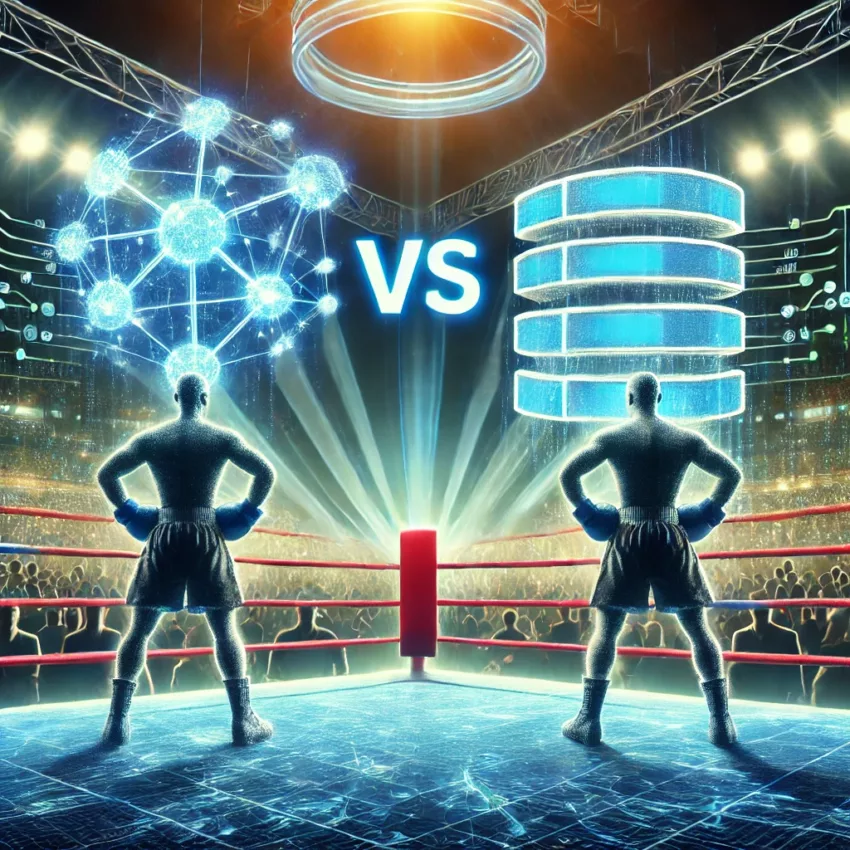Introduction: Data Storage Wars! 🥊
Imagine two warriors stepping into the ring: Blockchain, the futuristic, transparent, and secure contender, and Traditional Databases, the experienced, structured, and reliable veteran. Who will come out on top? 🏆
If you’ve ever wondered whether blockchain is just a hyped-up buzzword or a real game-changer compared to traditional databases, this post is for you! Let’s break it down in a fun and easy-to-understand way.
Round 1: Centralization vs. Decentralization 🏛️ vs. 🌎
Traditional Databases: The Control Freak
A traditional database is like a bank 🏦. One central authority manages everything. You trust that they won’t mess up (or, you know, lose your money). All the power lies in the hands of a single entity, whether it’s a business, government, or a cloud service provider.
✅ Pros:
- Fast and efficient for large-scale transactions
- Well-established and widely used
- Controlled access ensures data integrity
❌ Cons:
- Prone to hacking – one security breach can expose all data.
- A single point of failure – if it goes down, your data becomes inaccessible.
- Requires trust in the authority managing the database
Blockchain: The Power to the People!
Blockchain, on the other hand, is like a public bulletin board where everyone has a copy. Instead of one person controlling it, multiple participants (nodes) keep a record of transactions, ensuring transparency and security. 🏗️
✅ Pros:
- No single point of failure (if one node goes down, others keep the network running!)
- Highly secure and tamper-proof due to cryptographic validation 🔒
- Transparent and trustless system
❌ Cons:
- Slower compared to traditional databases
- Can be expensive due to energy-intensive processes like mining (for some blockchains)
- Not ideal for storing large amounts of non-transactional data
🚀 Winner? If you value security and decentralization, blockchain takes this round!
Round 2: Data Integrity & Security 🛡️
Traditional Databases: Trust Issues?
Traditional databases rely on administrators and security protocols. But if an internal admin decides to tweak the data or if hackers gain access, there’s little you can do. Ever heard of data breaches? Yeah, they happen all the time. 😬
Blockchain: Impossible to Cheat!
With blockchain, every transaction is permanently recorded and time-stamped. Want to alter past data? Sorry, not happening! To change something, you’d need to modify every copy across all nodes in the network. Good luck with that! 🤣
🚀 Winner? Blockchain crushes this round with its unchangeable ledger!
Round 3: Speed & Scalability ⚡
Traditional Databases: Fast and Furious
These databases are optimized for speed and handle thousands of transactions per second. Perfect for banking, e-commerce, and day-to-day applications.
Blockchain: Slow but Steady
Since every transaction must be verified across multiple nodes, blockchains tend to be slower. Imagine if you had to get approval from 100 people before making a simple purchase – yeah, that’s blockchain for you. 😅
🚀 Winner? Traditional databases win for sheer speed and efficiency!
Round 4: Cost Efficiency 💰
Traditional Databases: Cheaper but Centralized
Since these databases operate on centralized servers, they tend to be more cost-effective. However, businesses still spend a fortune on security, maintenance, and backups.
Blockchain: Secure but Pricey
Blockchain’s security and decentralization come at a price – literally! Storing data on blockchain networks (especially Proof-of-Work ones like Bitcoin) can be costly due to transaction fees and mining energy consumption.
🚀 Winner? Traditional databases take this round for being budget-friendly!
Round 5: Transparency & Trust 🤝
Traditional Databases: Behind Closed Doors
Most traditional databases are private, meaning only authorized personnel can view and modify data. This is great for security but bad for transparency.
Blockchain: Open and Trustless
With blockchain, data is publicly accessible and can’t be tampered with. It builds trust because no single entity has control over the entire system.
🚀 Winner? Blockchain wins this round for its trustless transparency!
The Final Verdict: Which One Should You Choose? 🤔
Both blockchain and traditional databases have their strengths and weaknesses. Here’s when you should choose each:
✅ Choose Traditional Databases if:
- You need fast and scalable transaction processing
- Security is handled internally, and trust is not an issue
- Cost efficiency is a priority
✅ Choose Blockchain if:
- You want decentralization and transparency
- Security and tamper-proof records are essential
- You’re dealing with digital assets or smart contracts
Final Score: A Tie! 🎉
There’s no universal winner – it all depends on your needs. But if you’re in crypto, supply chain, or digital identity verification, blockchain might be the future you’re looking for! 🚀
Wrapping Up: What Do You Think? 💭
What’s your take on the Blockchain vs. Traditional Databases debate? Do you think blockchain will replace traditional databases one day, or will they coexist?
💬 Drop your thoughts in the comments below!
🔗 Want to dive deeper? Subscribe for more fun and easy-to-understand blockchain guides!
#Blockchain #TraditionalDatabases #Crypto #DataStorage #Web3
Previous Post: 4 Blockchain Types You Need to Know
Next Post: Discover The Top 9 Blockchain Platforms
